-
 7 min. read
7 min. read
-
 Trevin Shirey
Trevin Shirey VP of Marketing
VP of Marketing
- Trevin serves as the VP of Marketing at WebFX. He has worked on over 450 marketing campaigns and has been building websites for over 25 years. His work has been featured by Search Engine Land, USA Today, Fast Company and Inc. Read his review of working with WebFX for the last 15 years.
With advanced personalization available with almost every marketing strategy, it’s common to wonder, “Does Google personalize search results?” It’s an important question to ask because it affects not only your searches as a person, and as a consumer, it affects how companies market online through search. In this post, we’ll cover:
- Does Google personalize search results?
- What causes differences in search?
- How to optimize for personalized searches
For more search information, tips, and tricks, sign up for our newsletter, Revenue Weekly!
Does Google personalize search results?
Not really. Google personalizes search results to a very limited degree and only does it in certain instances, like with location-based searches. Personalized search results used to be more prevalent in the past, but now, search results focus more on fitting user search intent.
What is Google personalized search?
Google fully incorporated personalized results into the search for every user back in 2009.
Google then used anonymous cookies to track a user’s past 180 days of search history.
The algorithm used anonymous cookies from proprietary and partner sites that tracked user data to personalize search results. This stored data from web browsers changed the results that users saw.
Using that information, Google gave preference to sites in search, bumping their results higher and showing them more often. Doing so, however, created concern that users would only see the information they’re predisposed to, creating an information bias.
Google also has stated that personalized search doesn’t add many benefits to search. So, over the years, the degree to which Google personalizes search has shifted. Instead, Google has chosen to focus more on the intent behind queries rather than user demographics and behaviors.
How does Google personalized search today?
While personalization is mostly omitted from search results, there are a few factors that can lead search results to skew in a way that fits each user.
Let’s take a look at some of those factors.
Location
Geographic location plays a major role in providing users with different search results. Google will give the users different location-based information depending on where they are located. Users find this useful when conducting “near me” searches when they are looking for products and services in their immediate area (such as searching “restaurants” to find eateries close by).
Users will get different results if they’re in New York versus Chicago, and even if users are in different parts of the same city. There are a couple of ways that Google can track user location. One is through the IP address.
Another is through mobile GPS locations or past locations.
Web history
Google personalizes search using the web history of users, as well, though not to the degree it used to, and it seems to be used mostly with ads in search rather than the organic results. The anonymous cookies that Google places track the recent sites that users visited. Google then can give preference to these sites’ ads on relevant searches.
For example, I searched “salt and pepper diamond ring,” and then click on the first organic result.
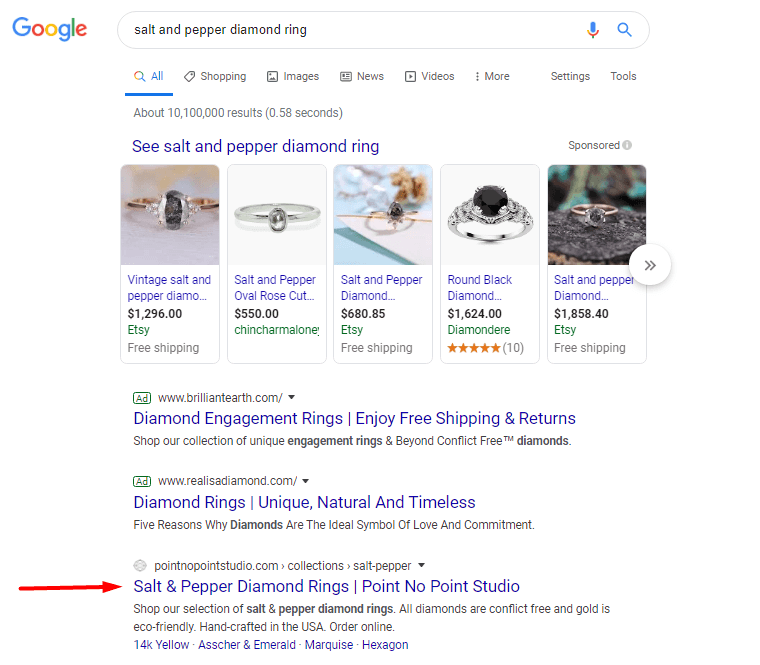
The next time I searched the same query, Google knew I clicked on that result and included an ad from that site in the results.
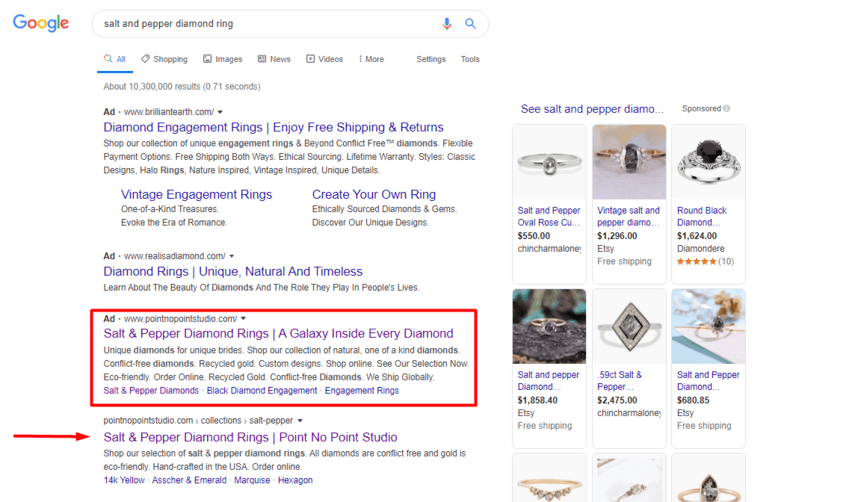
Search history
Google still uses search history to customize search results, so they’re more relevant, but unlike the past, Google only uses the previous search a user has made. The user’s previous search helps Google understand what they’re looking for contextually. It also helps Google determine the context behind search terms so it can better match the intent behind search queries.
Even then, personalization turns up rarely and is difficult to replicate. Even if you searched “fruit,” and then “apple,” you’ll still get results for the tech company rather than the fruit.
Paid search ads
While paid search ads, also called pay-per-click (PPC) ads, don’t impact the number of organic search results that appear, the ads are often personalized to a user’s location, so it can affect how they engage with the search results. For example, if someone searched for a business in Los Angeles, they may get only one PPC ad, whereas someone in New York could get three PPC ads.
What causes differences in search results?
There are many reasons why search results can appear different for each user.
Let’s take a look at some factors that cause differences in search results amongst users:
Time
The time users access search can change what they see. Google continuously updates what results appear in search due to what is current (especially for news and top stories). With events happening in real time, like articles posted during the Super Bowl, search results can vary drastically between page refreshes.
Google updates
Even if the topic is evergreen, results can change due to unannounced Google algorithm testing and updates.
With testing, small groups of users may be shown different results to allow Google to collect accurate search behavior data. And due to the vast amount of data that Google’s algorithms aggregates, processing and distributing the data to data centers may cause a slight lag, which can result in a brief difference in results for users.
Device
Google changes how search results look between devices. For the most part, the search results remain the same between mobile and desktop.
The main difference is the appearance of the listings in the search results. The desktop presents organic results as text. I’ve highlighted two of the results to show the difference between desktop and mobile:
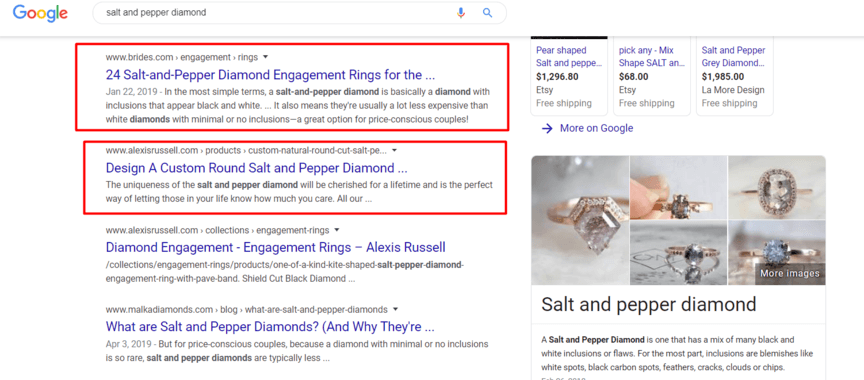
On the other hand, mobile presents organic results as cards and includes pictures.
Notice how the two results I’ve highlighted have switched positions:
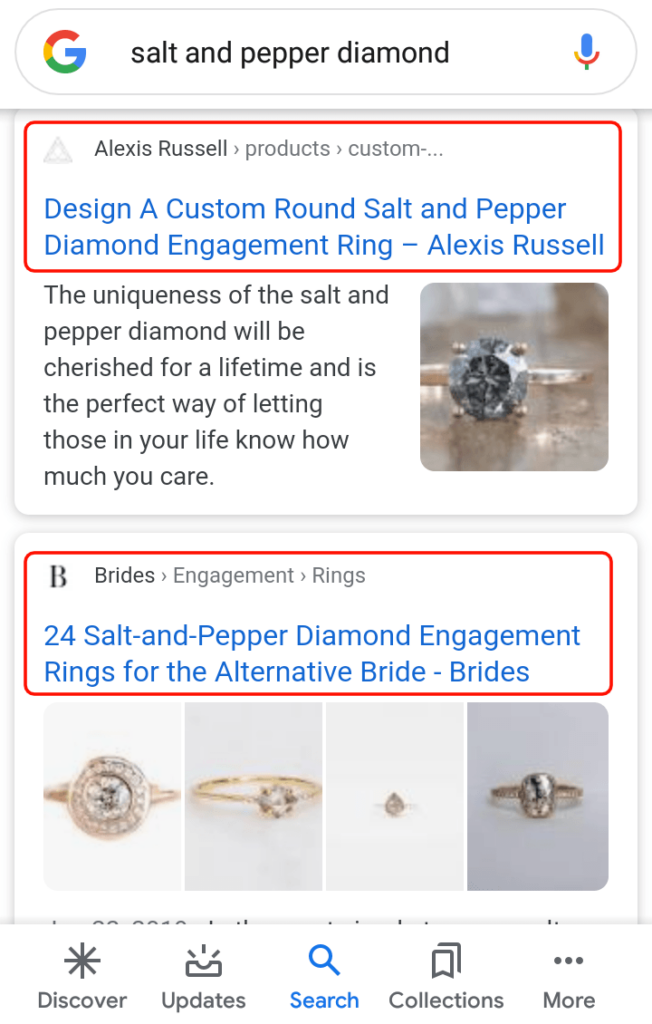
Sometimes there will be a difference in search features, such as mobile-only search features like the Interesting Finds module:
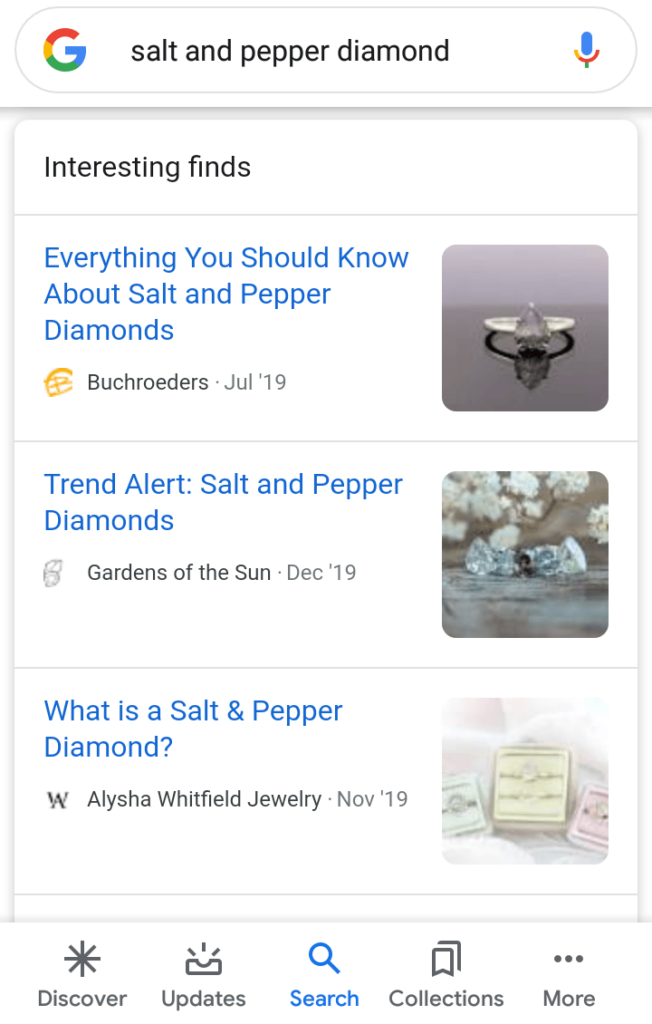
The difference in search results used to be more drastic, with desktop and mobile showing different organic results. Google had separate indexing for both mobile and desktop. But since the change to mobile-first indexing, Google indexes sites based on their mobile versions and displays them on all device results pages.
The main differences in search between devices now are due more to the behaviors that people have on each device.
Google will show users sites that are more mobile-friendly and contain immediate answers higher up on mobile searches.
Page speed also has an impact. Google prefers pages with fast load speed on mobile. It is an essential factor on desktop as well.
How to optimize for personalized searches
Personalized search results used to be a headache for companies trying to optimize for search engine optimization (SEO).
Marketers who specialized in SEO (called SEOs) had to keep track of how their results would look for both typical search results and personalized search results.
Looking for an all-in-one SEO audit tool? You’ve found it
SEO checker provides data on key metrics to give you:
- Complete SEO score
- Site Speed Analysis
- Content Grade
- and more.
As Google cut down on personalization in search results, SEOs needed to optimize for fewer types of search results. Instead of creating two optimization strategies, the focus is now on creating one.
Optimizing for local SEO mainly includes these three steps:
- Claiming your Google Business Profile (GBP) listing
- Choosing locally based keywords like “burger shop in Los Angeles”
- Adding name, address, and phone number (NAP) information for consistency across websites
Become an expert SEO with WebFX!
Now that you know the answer to “does Google personalize search results,” you can feel more confident in building your SEO strategy. Need more SEO resources? As a top SEO company, WebFX has what you need to get started with your next SEO campaign.
Check out our free SEO guide and contact us online or call us at 888-601-5359 to speak to an SEO consultant!
-
 Trevin serves as the VP of Marketing at WebFX. He has worked on over 450 marketing campaigns and has been building websites for over 25 years. His work has been featured by Search Engine Land, USA Today, Fast Company and Inc. Read his review of working with WebFX for the last 15 years.
Trevin serves as the VP of Marketing at WebFX. He has worked on over 450 marketing campaigns and has been building websites for over 25 years. His work has been featured by Search Engine Land, USA Today, Fast Company and Inc. Read his review of working with WebFX for the last 15 years. -

WebFX is a full-service marketing agency with 1,100+ client reviews and a 4.9-star rating on Clutch! Find out how our expert team and revenue-accelerating tech can drive results for you! Learn more
Try our free Marketing Calculator
Craft a tailored online marketing strategy! Utilize our free Internet marketing calculator for a custom plan based on your location, reach, timeframe, and budget.
Plan Your Marketing Budget

SEO Success with KOA

Proven Marketing Strategies
Try our free Marketing Calculator
Craft a tailored online marketing strategy! Utilize our free Internet marketing calculator for a custom plan based on your location, reach, timeframe, and budget.
Plan Your Marketing Budget
What to read next






